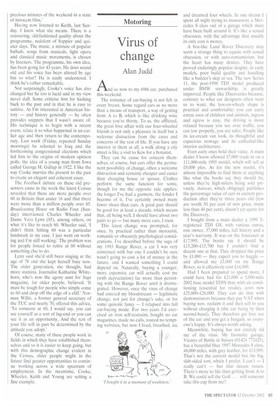Motoring
Virus of change
Alan Judd
And so now to my 69th car, purchased this weekend.
The romance of car-buying is not felt in every breast. Some regard cars as no more than a means of transport, a way of getting from A to B, which is like drinking wine because you're thirsty. To us, the afflicted, the great love affair with our four-wheeled friends is not only a pleasure in itself but a welcome distraction from the cares and concerns of the rest of life. If you have any interest in them at all, a walk along a city street is like a visit to Kew for a botanist.
They can be cause for concern themselves, of course, but cars offer the permanent possibility of change, often a welcome distraction and certainly cheaper and easier than changing house or spouse. Clothes perform the same function for some, though for me the opposite rule applies: the longer I've had a garment, the fonder I become of it. I've certainly owned many fewer shoes than cars. A good pair should be good for at least a decade, which means that, all being well, I should have about two pairs to go — but many more cars, I trust.
This latest change was prompted, for once, by practical rather than mercurial, romantic or obscurely psychological considerations. I've described before the saga of my 1993 Range Rover, a car I was very contented with but one I couldn't be sure wasn't going to cost a lot of money in the future, and I wanted something I could depend on. Naturally, buying a younger, more expensive car will actually cost me (with depreciation) far more than persisting with the Range Rover until it disintegrated. However, once the virus of change had entered my bloodstream — legitimate change, not just for change's sake, or for some quixotic fancy — I relapsed into full car-buying mode. For two years I'd exercised an iron self-restraint, bought no car magazines, made no calls, toured no tempting webs ites, but now I lived, breathed, ate
and dreamed four wheels. In one dream I spent all night trying to manoeuvre a Mercedes S class out of a garage which must have been built around it. It's like a sexual obsession, with the advantage that usually its only cost is money.
A box-like Land Rover Discovery may seem a strange thing to equate with sexual obsession, or with auto-romanticism, but the heart has many desires. They have proved enduringly popular despite, in early models, poor build quality and handling like a builder's skip at sea. The new Series 11, the post-1998 TD5 model produced under BMW stewardship, is greatly improved. People like Discoveries because, contrary to what car designers often want us to want, the box-on-wheels shape is practical and comfortable: you can carry entire zoos of children and animals, ingress and egress is easy, the driving is more relaxed because you see over traffic, you can tow properly, you are safer. People like its ice-cream van look, its thoughtful and capacious stowage and its cathedral-like interior architecture.
Even early ones hold their value. A main dealer I know allowed £7,000 trade-in on a 111,000-mile 1995 model, which will sell at £9,000 plus. As for the new model, it's almost impossible to find them at anything like what the books say they should be, unless they're high-milers being sold privately. Autocar, which obligingly publishes the percentage value of cars in current production after they're three years old (few are worth 50 per cent of new price, many less than 40 per cent), doesn't yet quote for the Discovery.
I bought from a main dealer a 1999 Tregistered TD5 GS, with various extras, one owner, 37,000 miles, full history and a year's warranty. It was on the forecourt at £17,995. The books say it should be £15,200415,700 but I couldn't find a decent one at that. They dropped the price by £1,000 — they expect you to haggle — and allowed me £3,000 on my Range Rover, so it effectively cost £14,000.
Had I been prepared to spend more, I could have had for £21,000 a 5,000-mile 2002 base model TD5S that, with air conditioning (essential for resale), costs new £25,000426,000. They can do that with demonstrators because they pay VAT when buying new, reclaim it and then sell to you without charging it (the car being by then second-hand). They therefore get free use of the car and you get a bargain, so everyone's happy. It's always worth asking.
Meanwhile, buying has not entirely rid me of the virus. My favourite garage, Vicarys of Battle in Sussex (01424 772425), has a beautiful blue 1997 Mercedes S
48,000 miles, with grey leather, for £13,995. That's not the current model but the big, slab-sided sort, which I prefer. I can't — I really can't — but that dream recurs. There's more to life than getting from A to B. We could sell the Golf. . will someone take this cup from me?


































































































 Previous page
Previous page